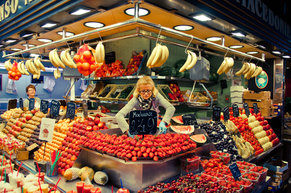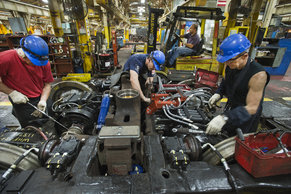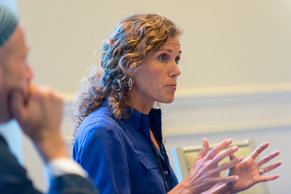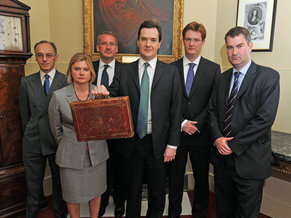 |
A-Z | Popular | Blog | Business | Search » |
|
Business  Related Guides
Business
Key Concepts
Competitive Advantage  Business
Related Topics
Business Costs  Business Economics  Business Goals  Business Plans  Business Metrics  Business Theory  Marketing  Branding  Management  Risk Management  |
50 Types Of Business
Business is the process of creating and capturing value. All viable businesses are based on a business model that represents a method for creating value for customers and capturing this value as revenue in a competitive market. The following are the basic types of business.
RetailSelling goods and services from a physical shop.One Stop ShopA one stop shop offers significant variety such that customers can accomplish many things at the same place. For example, a supermarket that offers an extremely broad range of goods and services such as dry cleaning.Store Within a StoreA small shop inside a larger retail location. For example, a department store that caters to young fashion enthusiasts that offers space to trendy new brands in exchange for a percentage of sales.EcommerceA broad category of commerce that includes any sale of goods or services that use digital channels. For example, a streaming music service that provides access to media for a monthly recurring fee.Two-Sided MarketA firm that connects buyers and sellers without actually selling anything directly. For example, an online auction site.Long TailA business that allows amateurs to access a market that was once exclusively controlled by professionals. For example, a video sharing site that allows anyone to monetize videos. This may compete with professionally produced television shows, music videos and movies.Bricks & ClicksA business that is able to leverage both physical locations and ecommerce capabilities in an integrated way. For example, a product showroom where you can try products and then order them online.ManufacturingThe production of goods. In some cases, manufacturers also market, sell and distribute goods including after-sales service. Alternatively, a manufacturer may sell goods to partners who handle marketing and distribution.Mass CustomizationA manufacturer that produces unique items customized for each customer. For example, a sporting goods company that allows customers to produce unique shoes to order using a design tool.BespokeThe production of unique goods in consultation with the customer. The term bespoke implies the work of a skilled professional such as a tailor as opposed to a manufactured item.CraftProduction that is done by hand. This may result in premium items that can compete on quality.Contract ManufacturingManufacturing goods to specifications for a fee. Contract manufacturers typically require a minimum production size and prices fall as you scale.White LabelA manufacturer that produces standard unbranded products than can then be branded and packaged by retailers and ecommerce sellers.Manufacturing as a ServiceA manufacturer that can quickly produce unique items to specifications in orders as small as one unit.Design & MarketFirms that design their own products and market them under their own brand but contract out manufacturing. For example, a fashion designer who designs clothing and markets it under their own brand name.MarketingHandling elements of promotion, pricing and selling goods without handling any other part of the value chain. For example, a solar industry expert who generates sales leads and then sells them to installers.Complementary GoodsManufacturing and marketing goods that complement another product or service. For example, accessories that are compatible with a popular mobile device.Value Added ResellerA value added reseller takes the products or services of another firm and adds value to them. For example, a software company that offers a data analytics tool that is built on top of another firm's data analytics platform.Original Equipment Manufacturer (OEM)The manufacturer of parts and components that go into the products of other firms. For example, a manufacturer of efficient electric motors that go into other products such as air conditioning units.Razor & BladesA durable product that regularly consumes a compatible product. For example, a water dispenser that is sold with a service that regularly delivers water.Fast Moving Consumer Goods (FMCG)The manufacturer and marketing of consumable goods that consumers regularly buy such as food, cosmetics and beverages. This is an intensely competitive business dominated by large firms with deep competitive advantages such as widespread brand recognition.Niche GoodsDeveloping products and services that meet relatively unique customer needs. This is a way for a small business to compete with far larger competitors that benefit from superior economies of scale. For example, a small local bakery that offers high quality wedding cakes.RecommerceBusiness models based on the reuse of products and assets. For example, a carpenter who buys and renovates old houses for resale.Product as a ServiceProviding access to a physical product for a rental or subscription fee as opposed to a purchase. For example, a bicycle rental club with unlimited use of local bicycles for a monthly fee.Software as a ServiceProviding access to managed software applications and systems over a network such as the internet. This allows customers to use tools and automation without buying and managing hardware and software installations.FranchisingA business that licenses a complete business. For example, a restaurant chain that provides everything required to open a restaurant location such as know-how, processes and branded products and services. This benefits the franchisor as they can expand profits without investing more capital. In theory, it can also benefit the franchisee as they are able to start a small business based on an established business model and brand.Digital GoodsDesigning, developing and marketing goods that have no physical form such as an ebook.Digital ExperienceA service that is fully digital and non-downloadable such that it can be experienced but not owned. For example, a video game that can be played online.Consumer ServicesConsumer services such as a restaurant, hotel or airline. Services offer primarily intangible value such as an experience.Club GoodsProviding shared access to significant capital for an entrance fee. For example, a ski resort or a theme park.Business ServicesBusiness services such as a digital advertising platform.Staffing ServicesOffering labor without the commitment of hiring employees. For example, a firm that offers temporary workers with basic office skills at a daily rate.ConsultingConsulting is knowledge work that is offered to customers at a daily rate or as a fee for deliverables. For example, a software developer who develops an app to requirements for a flat fee of $40,000.OutsourcingTaking over internal practices of a business in exchange for an ongoing fee. For example, a firm that processes another firm's payroll to produce payments and pay slips in exchange for a monthly recurring fee based on the number of employees at the firm.Financial IntermediationConnecting savers with borrowers. The foundational business model of retail banks. This adds value by putting money to work and providing low risk ways to save money.PaymentsServices that execute payments and money transfers. A basic foundation for all commerce.InvestmentProviding advice and ways to put money to work. This implies some degree of risk taking.Investment BankingFinancial services for institutions, companies and high-net-worth investors. For example, a bank that helps a company issue bonds or acquire a competitor.ExchangesFirms that run financial markets such as a stock market or commodity exchange.Market MakerA firm that provides liquidity to a market by being willing to buy and sell at any time. This is heavily regulated and is a complex business. Market makers produce a profit by charging a spread. In other words, they buy low and sell high but only by a limited amount known as a spread that is set forth in their agreement with an exchange.ArbitrageTaking advantage of price differences between markets to profit. This entails some risk as price differences may correct very quickly. Also, a large delta in price may indicate that one market has better information and the instrument being traded is about to head lower in both markets. Arbitrage only works well if you are far more sophisticated and fast than the average trader on the market.InsuranceFirms that allow customers to transfer risk for a fee.TrainingProviding training such as tutoring or professional training.EventsOrganizing and promoting events such as concerts or business conferences.Consumer to ConsumerIndividuals that sell directly to other individuals without an intermediary. For example, a carpenter who works for homeowners directly by the hour or job.Import & ExportTaking advantage of differences in the availability and price of goods between different markets. This creates value by making goods available. For example, an ecommerce seller who imports entire containers of Italian shoes to sell in Japan.WholesaleThe sale of goods to entities that aren't the end-customer. This typically involves buying goods in significant quantities, warehousing them and selling them in smaller quantities. For example, a food wholesaler who purchases large lots of meat, fish, vegetables and packaged products from geographically distributed producers and then sells them in relatively small quantities to local supermarkets and restaurants.LogisticsServices that manage the flow of goods from origin to destination including transport and warehousing.AgentRepresenting the commercial interests of a client for a fee. For example, a real estate agent that represents buyers and sellers in real estate transactions.Good BusinessA business centered on making a positive impact on the environment and communities as opposed to being solely driven by a profit motive. Such firms have made inroads in competing with incumbent firms that may have poor reputations or be inauthentic in their attempts to look green to conform to modern values. In theory, societies will eventually do what is in their best interests and penalize the production of economic bads. This should favor good businesses in the long run.BusinessThis is the complete list of articles we have written about business.If you enjoyed this page, please consider bookmarking Simplicable.
BusinessA list of common business models.Brand Recognition vs Brand Awareness
The difference between brand recognition and awareness explained.
Business Why
A list of business whys.
Media Business
The common types of media business.
Business Technology
A list of business technologies.
Business Software ExamplesA list of common types of business software.Logistics Examples
An overview of logistics with examples.
Business Situations
A list of common business situations.
Marketing Management Examples
An overview of marketing management with examples.
Discontinuous ChangeThe definition of discontinuous change with examples.Business Model ListA list of business models by industry.Sales Promotion Examples
An overview of sales promotions with examples.
Business ModelsA list of common business models.Business MarketA list of major business markets.International Business
An overview of international trade with examples.
Hospitality Services
An a-z list of common hospitality services.
RestaurantsAn a-z list of the different types of restaurants with a few brief definitions.Consumer Staples
A list of consumer staples.
Media Products
A list of common media products.
Industrial Market
An overview of the industrial market with examples.
Creative Economy
A list of business models and industries in the creative economy.
Business GoodsAn overview of business goods with examples.TrendingThe most popular articles on Simplicable in the past day.New ArticlesRecent posts or updates on Simplicable. Site Map
© 2010-2023 Simplicable. All Rights Reserved. Reproduction of materials found on this site, in any form, without explicit permission is prohibited. View credits & copyrights or citation information for this page. |